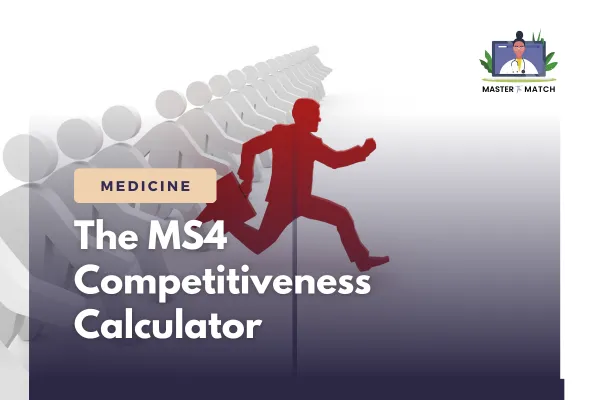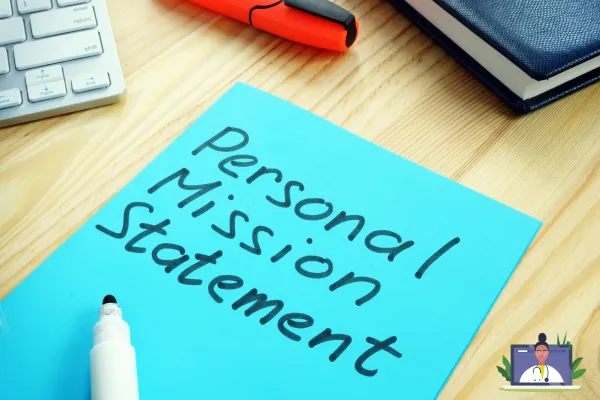Blog
Pearls from Kia Byrd, MD

The MS4 Competitiveness Calculator: Understanding Your Competitiveness
With the MS4 Competitiveness Calculator, learn how to excel in the residency application process. Understand your competitiveness and stand out with extracurricular activities and school ranking insights.

Mastering the Residency Personal Statement
Introduction:
If you're staring at a blank page, feeling overwhelmed about your residency personal statement, you are not alone. One of the biggest secrets to the residency application is nailing the personal statement, yet many applicants struggle with where to begin. Fortunately, I’ve got you covered! In this blog, we’ll break down why the personal statement matters, how programs use it, and actionable brainstorming strategies to help you craft a compelling narrative.

Why the Residency Personal Statement Matters
Let’s start with a reality check: your personal statement is not a summary of your CV. Many applicants make the mistake of rehashing their accomplishments as if it’s just another section of their application. However, program directors and selection committees already have your CV. Your personal statement should bring your journey to life, showcase your personality, and let your authentic voice shine.
Your goal is to tell a compelling story, not to write a research paper. Coming from a scientific background, it’s easy to fall into the trap of overly structured, impersonal writing. But the personal statement is your biggest opportunity to humanize your application and demonstrate who you are as a person and what kind of doctor you will be.
How Programs Use Your Personal Statement for Residency Applications
Residency programs rely on personal statements to:
Understand you beyond your scores –
The MS4 Competitiveness Calculator factors in your Step scores and transcripts, which tell programs about your academic abilities, but your personal statement conveys your motivations, values, and drive.
Assess your fit –
Programs want to see if your goals align with theirs. Are you a good match for the program’s strengths and values?
Mitigate weaknesses in your application –
A strong personal statement can help explain gaps in your education, a low Step 2 score, or a specialty switch. It allows you to provide context and showcase resilience.
Three Key Elements of a Powerful Residency Personal Statement
1. Your 'Why' – Why This Specialty?
This is the heart of your personal statement. Residency programs want to know that you understand what you’re signing up for and that you are genuinely committed to your chosen field. Avoid the residency application mistake of misaligning details in your personal statement and CV. These should both explain "Why" your chosen specialty.
Ask yourself:
Was there a patient encounter that sparked your passion for this specialty?
Did a mentor or defining moment influence your decision?
Do you have a personal story that led you to this specialty?
For example, I initially thought I wanted to pursue OB/GYN, but during my internal medicine rotation, I encountered mentors who were not only excellent teachers but also passionate about patient care. That experience shifted my perspective and solidified my choice.
2. Your Unique Journey
Your personal statement should tell the story of how you got here. What challenges have you overcome? What experiences shaped your perspective? Residency programs read thousands of applications, so your statement should help you stand out.
Think about:
Rotations or clinical experiences that had a significant impact on you.
Life experiences that provide insight into your character.
Lessons learned from setbacks, such as a lower-than-expected board score or a gap year.
When I applied to residency, my Step 1 score was slightly below average. Initially, I worried that this would limit my opportunities. However, I used my personal statement to highlight my resilience and ability to bounce back, which reassured programs about my ability to handle the demands of residency.
3. Your Future Contributions
Programs want to know what kind of resident you will be and what you bring to their program.
Consider:
How will you contribute to the field?
Are you passionate about medical education, research, or advocacy?
Do you see yourself serving underserved communities?
For me, I knew I wanted to combine my interest in health policy with my clinical training. In my personal statement, I articulated how my Master’s in Public Health and my experience in policy work would allow me to advocate for systemic changes in healthcare.
Brainstorming Strategies to Unlock Your Story

Method 1: The Five-Minute Free Write
Set a timer for five minutes and write about the most impactful patient you encountered. Don’t overthink it—just write. Once finished, review your notes and see what themes emerge.
Method 2: The ‘Why’ Web
Take a blank sheet of paper and write “Why I Chose [Your Specialty]” in the center. Then, branch out with specific moments, mentors, or experiences that influenced your decision. Look for patterns in what excites you about the field.
For instance, one of my defining experiences involved a 64-year-old woman newly diagnosed with HIV who faced housing insecurity. That patient encounter underscored my passion for holistic, patient-centered internal medicine.
Method 3: The Three-Word Exercise
If a program director had to describe you in three words, what would they be? Resilient? Compassionate? Hardworking? Then, think of stories from your training that illustrate these traits.
Common Pitfalls to Avoid
1. Being Too Generic
If your statement could apply to any applicant in your field, it’s too generic. Be specific and use vivid details to paint a picture of your journey.
2. Listing Achievements Instead of Storytelling
Your CV lists your accomplishments. Your personal statement should connect the dots and show growth.
3. Trying to Sound Perfect
Perfection isn’t relatable. Vulnerability and authenticity make your statement memorable. Don’t hide your struggles—explain how you grew from them.
Next Steps: From Brainstorming to Writing the Residency Personal Statement

Review your notes and identify themes. Look for commonalities in the experiences that shaped your journey.
Choose one core story to tie everything together. This central theme will help structure your statement.
Outline before writing. Having a clear structure makes the process smoother.
Need More Help?
I’ve created a free Residency Personal Statement Brainstorming Guide that walks you through this entire process, step by step. Download it using the link here!
And if you’re looking for comprehensive residency application guidance, check out Master the Match—my program designed to help medical students navigate the application process with confidence. Inside, you’ll find personal statement coaching, interview strategies, and insider tips from a Harvard-trained physician (me!).
What’s your biggest challenge with writing your personal statement? Drop a comment below—I’d love to help!
Be sure to like, subscribe, and stay tuned for more residency application tips!
Ready to Elevate Your Residency Application Game?
Dive deeper into mastering the match with our online course, "Master the Match." Explore exclusive insights and strategies to boost your competitiveness. Click here to access our MS4 Competitiveness Calculator – your key to unlocking residency success. Don't miss out – invest in your future today!

Get FREE Tools & Tips
Get all of my best tips, articles, calculators, and strategies to thrive in Medical School and Beyond! Click the link >>
100% free of charge!
Copyright 2025 | Kia Byrd MD | All rights reserved. Privacy Policy & Terms and Conditions

